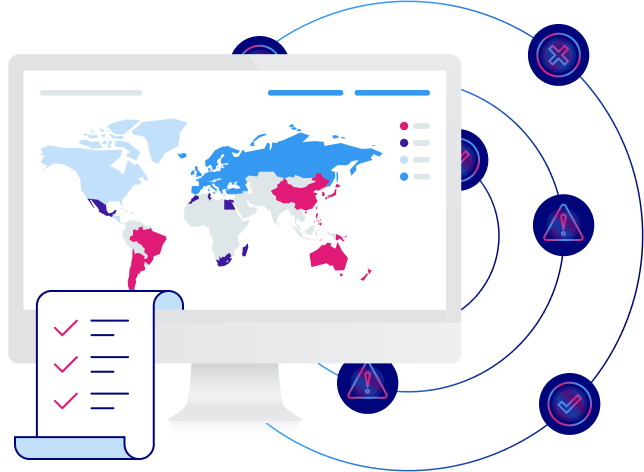-
Solutions
- AI Governance
- AI Risk
- Geo-Specific Cookie Banner
- Consumer Preference Management
- Data Subject Request Automation
- Data Mapping and Vendor Risk Management
- Privacy, Vendor, and Risk Assessments
- Privacy Program Management
- Regulatory Guidance
- Privacy Program Consulting
- Certifications and Verifications
- International Data Transfers
Forrester TEI ROI of Privacy ReportTrustArc commissioned a Forrester study to analyze the potential benefits of using our platform and the Forrester team found ROI linked to efficiency, compliance, and decreased cost in data breaches.
Read the report -
Products Products Privacy Studio Overview
Automate consent and data subject rights compliance. Design seamless privacy experiences to enhance customer trust across your digital landscape.
- Cookie Consent Manager Effortlessly manage cookie consent for global compliance, ensuring a secure, personalized browsing experience.
- Consent & Preference Manager Easily manage and orchestrate customer consent and preferences across brands and channels.
- Individual Rights Manager Automate and streamline DSR workflows to ensure compliance and show your commitment to customer rights.
- Trust Center Quickly centralize, manage, and showcase all trust and safety information in an easily customizable, no-code hub.
Products Governance Suite OverviewStay ahead of privacy and compliance regulations. Simplify data privacy management and ensure data governance with cutting-edge apps.
- PrivacyCentral Centralize privacy tasks, automate your program, and seamlessly align with laws and regulations.
- Data Inventory Hub & Risk Profile Gain full visibility and control of your data and accurately identify and mitigate risks.
- Assessment Manager Automate and score privacy assessments like PIAs and AI Risk, streamlining your compliance workflow.
- Nymity Research Get instant access to the latest in privacy regulations, legal summaries, and operational templates.
Products Assurance Services OverviewGain trust and credibility with leading privacy certifications from unbiased experts, backed by technology for unmatched privacy compliance assurance.
- Dispute Resolution
- TRUSTe Enterprise Privacy Certification
- TRUSTe EDAA Privacy Certification
- TRUSTe APEC CBPR and PRP Certification
- TRUSTe Data Collection Certification
- CCPA/CPRA Validation
- Data Privacy Framework Verification
- GDPR Validation
- Digital Advertising Alliance Validation
- TRUSTe Responsible AI Certification
-
Regulations
- EU General Data Protection Regulation (GDPR)
- California Consumer Privacy Act (CCPA)
- Virginia Consumer Data Protection Act (CDPA)
- NIST AI Framework
- ISO/IEC 27001
EU Artificial Intelligence Act (EU AI Act)EU's regulation on the use of AI and the world's first comprehensive AI law.
Learn moreData Privacy Framework (DPF)Transatlantic data transfer mechanism for EU-U.S., UK, and Swiss-U.S. commerce.
Learn more - Resources
- Contact us
Personal Information Protection Act (PIPA)
The purpose of South Korea’s PIPA aims to protect the rights, freedoms and dignity of individuals through the protection of their personal data.
Are you subject to South Korea’s PIPA?
While the PIPA does not include an article explicitly describing its applicability and territorial scope, it is understood that it applies to any personal information controller and personal information managers (e.g. public institutions) who:
-
Process personal information within South Korea.
-
Are established domestically and/or internationally.
Key obligations of the PIPA
Consent for processing
Personal information controllers may process personal information based on (among other conditions) consent, and the following shall be disclosed to data subjects at the time of obtaining consent:
- The purpose of collection and use of personal information;
- Categories of personal information that will be collected and processed; and
- The period for retaining and using personal information.
Processing children’s personal information
Personal information controllers and managers must obtain consent from the legal representative of a child to process personal information of a child under the age of 14, and verify the validity of the representative’s consent.
Notice to children and/or their legal representative about the processing of the child’s personal information must be provided in a clear and comprehensible manner.
Processing unique identifiers
Personal information controllers may process individuals’ resident registration numbers under specified conditions, including where:
- Prescribed Acts and/or Regulations permit or require such processing; and
- It is necessary for the protection of life, bodily and property interest of a data subject or third-party.
- Personal information controllers shall safeguard resident registration numbers via encryption methods to prevent unauthorized access and tampering.
Installation of fixed visual data processing devices (e.g., video cameras)
Personal information controllers and managers may install such devices:
- Where specifically permitted by prescribed statues;
- A legitimate authority is authorized to operate such devices for prevention and criminal investigations, facility safety, fire management, and traffic control; and
- When appropriate signage is also posted to inform data subjects of the occurrence, activities and activeness of such devices within an vicinity.
Designation of domestic representative
A representative shall be assigned and live within the territory of South Korea if an international personal information controller and/or manager does not have an established address or business office in South Korea. The contact information, duties and responsibilities of the representative shall be provided to the Personal Information Protection Commission.

CBPR – Navigating Cross-Border Data Privacy Compliance
In this highly anticipated webinar, we explore the background the future direction and assess the potential business case for companies considering certification under the new Global CBPR System.
Achieve compliance
-
Exercising individual rights Enjoy DSR automation with TrustArc’s Individual Rights Manager. Easily operationalize individual rights according to specific jurisdictions, leverage automated workflows to save time, and keep an audit trail of requests/actions.
-
Regulatory guidance Stay ahead of regulatory changes with expert guidance, ensuring your security and privacy practices remain compliant and up to date.

The information provided does not, and is not intended to, constitute legal advice. Instead, all information, content, and materials presented are for general informational purposes only.




